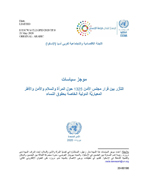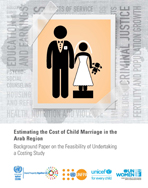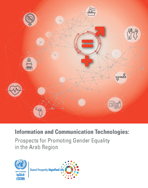Women's Rights

A fundamental principle of the United Nations Charter is equal rights for men and women. It is increasingly recognized that meaningful development and lasting peace cannot be achieved without the elimination of discrimination against women.
Equality between women and men requires changes in attitudes and power relations, in institutions and law, in economic regulations and the centres of political decision-making. It is up to States, international organizations and civil society to safeguard women's rights to education, political participation, freedom of choice, safety and security, health care and employmentThe Convention on the Elimination of All Forms of Discrimination against Women, adopted in 1979 by the General Assembly, is often described as an international bill of rights for women. Most Arab countries have ratified the Convention, but generally with reservations, in particular to article 2, which prohibits discrimination against women in national constitutions and laws. Few Arab States have ratified the Optional Protocol to the Convention, thereby limiting the right of women to file individual complaints to international human rights bodies. The 1994 International Conference on Population and Development (ICPD) affirms women’s right to sexual and reproductive health.









